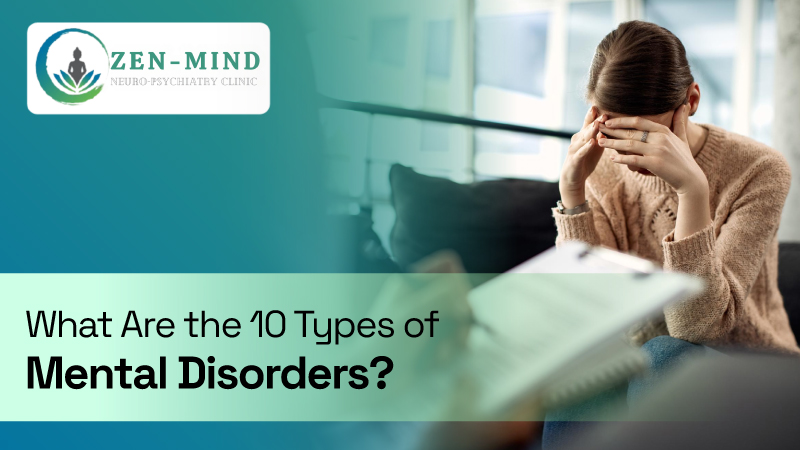What is The Mental Disorders?
What comes to mind when you hear the phrase “mental health”? For some, it’s stressful. Between others, it’s depression or anxiety. Mental health is a huge spectrum, and the fact that there is not only one kind of issue. Indeed, clinicians diagnose various disorders, collectively known as types of mental disorders, depending on the symptoms. If we understand these categories, then we can help alleviate stigma and support those who may not be feeling OK. If you are seeking Mental Health Treatment in Ahmedabad, then you should visit Zen-Mind Care Clinic, they have proven results for years.
So, let’s talk about the 10 types of mental disorders you definitely need to know about — without any of the jargon.

1. Anxiety Disorder
All of us get antsy before a big event, but anxiety disorder kicks it up a notch. People with this disorder have sudden and repeated attacks of fear that last for several minutes or longer. Phobias, panic disorder and generalised anxiety disorder are among them. It can also provoke physical symptoms, such as a racing heart or sweating, which can make the distress even worse. Thanks to the help of therapy, relaxation techniques and, in some cases, medications, many people realise how to manage it.
2. Bipolar Affective Disorder
Think of it as being bipolar at its most extreme. Those with bipolar disorder go from periods of high energy and euphoria (mania) to extreme lows (depression). These cycles can also take a devastating toll on work, relationships and functioning in everyday life. Manic periods can make people feel unstoppable, but they frequently result in poor choices or burnout. Stability is completely achievable with the right treatment program and a good support system.
3. Depression
“Depression is not just ‘feeling sad.’ It’s a lingering sense of hopelessness, emptiness or loss of interest in things you used to enjoy. It impacts sleep, appetite, energy and quality of life. Friends or family do not always pick up on it, which makes reaching out for help that much more crucial. Counselling, lifestyle changes, and sometimes, medication, when it is necessary, can help people feel like themselves again.
4. Eating Disorder
We all need food to survive, but for some people, food is a battle. They can also negatively impact both physical and mental health. They might otherwise be associated with body image, self-esteem and emotional health. They are not merely physical; they often mirror deeper emotional wounds. Early treatment and a supportive environment make recovery much more achievable.
5. Obsessive Compulsive Disorder (OCD)
OCD isn’t just “super clean.” It is characterised by repetitive, unwanted thoughts (obsessions) and ritualised behaviours, which can significantly interfere with a person’s daily life. It’s often misdiagnosed, but it’s very real and it’s treatable. People may feel like they’re caught in a cycle and know they’re doing something that doesn’t make sense, but can’t seem to stop. One of the most successful treatments for breaking this cycle is cognitive-behavioural therapy (CBT).
6. Post-Traumatic Stress Disorder (PTSD)
PTSD can develop after experiencing or witnessing a traumatic event like abuse, war, accidents, or natural disasters. Flashbacks, nightmares, and emotional numbness are common. People may avoid certain places or situations because they trigger painful memories. With proper therapy and understanding from loved ones, many learn to regain control over their lives.
7. Psychosis
Psychosis is when someone becomes untethered from reality. It can encompass hallucinations (seeing or hearing things that aren’t there) and delusions (false, fixed beliefs). It is observable as a symptom of other disorders, but can be addressed through treatment under professional care. And it can be scary for the sufferer and also those near them. Early intervention is important — the sooner that children get help, the better their long-term outcomes.
8. Schizophrenia
A graver form of psychotic disorder, schizophrenia, affects thinking, emotions and the perception of reality. Individuals may experience hallucinations, delusions and disorganised thoughts. With treatment, including medication and therapy, many lead full lives. It’s not the “split personality” that many like to imagine — it’s about disturbed cognition. Support networks and long-term care play a huge role in managing this condition.
9. Attention Deficit Hyperactivity Disorder (ADHD)
ADHD usually starts in childhood but can continue into adulthood. It involves issues with impulsivity, hyperactivity, and attentiveness. While it can affect learning and daily routines, many people with ADHD thrive with the right support. People with ADHD are often highly creative and energetic, but may struggle with focus. Structured routines, therapy, and sometimes medication can make a world of difference.
10. Addiction & Substance Abuse
Addiction is not just a “bad habit.” It is a brain disorder in which people lose control of the use of alcohol, drugs or even prescription medication. It alters brain chemistry so that quitting feels almost impossible without treatment and support. There can also be shame and stigma surrounding addiction, which can make asking for help more difficult. Recovery is greatly facilitated by rehab programs, good counselling, and strong social support.
Why Knowing These Matters
When you talk about the various kinds of mental illness, you’re not naming names — you’re seeking understanding. Mental health problems are pervasive, and silence and shame make them even worse. By learning to recognise the signs and types of mental disorders, we can help our loved ones get the support they need, encourage them to seek treatment, and, in general, build a society in which everyone feels safe being known.
Final Thoughts
We have just taken a tour of the 10 types of mental disorders, but remember this: Mental health is just as important to overall well-being as physical health, and if you or someone you care about is hurting, you do not have to do it alone Zen-Mind Care Clinic experts are there for you. For doctors, these are helpful buckets to diagnose and treat. Asking for help is an excellent place to begin.